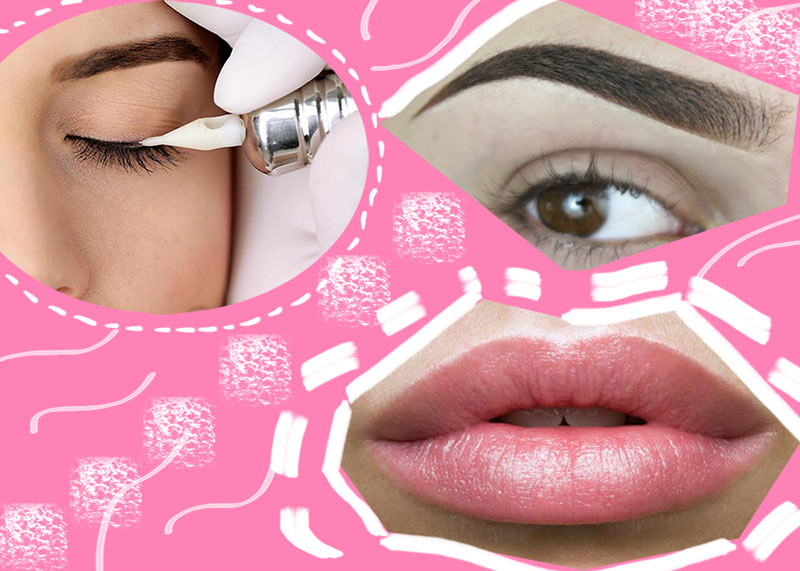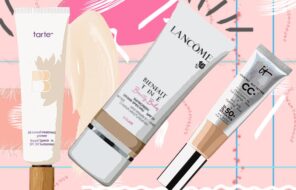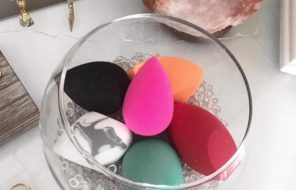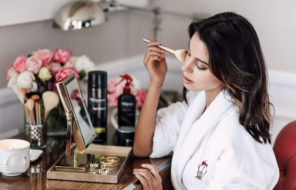Permanent makeup has been the go-to choice for all kinds of women for decades. Wouldn’t it be nice to wake up in the morning, rinse your face, and just go, with your face already made up?
Whether you just find it difficult to get that perfect eyeliner shape, or if you would like to be able to skip a few makeup steps in your routine, permanent makeup might be worth considering. However, as with any major cosmetic procedure, you should know exactly what you’re getting into before getting permanent makeup done.
Keep reading to find out everything you need to know about permanent makeup – exactly what it is, and how it is done, all of the pros and cons, the different kinds of permanent makeup services that exist, the safety concerns, maintenance, and even how to choose the perfect permanent makeup artist for you!
In this article:
- What Is Permanent Makeup?
- How Is Permanent Makeup Done?
- Who Is Permanent Makeup Good for?
- People Who Should Not Have Permanent Makeup Done
- Pros & Cons of Getting Permanent Makeup
- Is Permanent Makeup Safe?
- Preparing for the Permanent Makeup Procedure
- What to Expect After Permanent Makeup
- Aftercare and Maintenance of Permanent Makeup
- Choosing the Right Cosmetic Tattoo Artist
- Cost of Permanent Makeup
- How Long Does the Permanent Makeup Last?
- Common Types of Permanent Makeup
- Permanent Makeup Removal
What Is Permanent Makeup?
Dating back to the beginning of the 20th century, permanent makeup, also known as cosmetic tattooing or micropigmentation, is a shallow tattoo that is meant to create the look one would normally achieve with various makeup products. The most frequent permanent makeup options people choose to have done are eyeliner tattoos, lip line tattoos, and eyebrow tattoos.
How Is Permanent Makeup Done?
Using a single-use, disposable needle, a tattoo machine, and special cosmetic tattoo ink, a trained professional injects the ink into the dermis – that is, the central layer of the skin, below the epidermis (the top layer).
The tattoo machine (never a gun) used for cosmetic tattooing is much smaller than the average tattoo gun, and is shaped a little like a pen. It doesn’t inject the ink quite as deep into the skin as a traditional tattoo machine would, which means that permanent makeup does not last as long as an average tattoo.
Who Is Permanent Makeup Good for?
While everyone can consider getting permanent makeup done, there are people that are advised to go for it.
- People with alopecia and other conditions that can cause eyebrow and eyelash hair loss.
- Those who lack fine motor skills, and struggle to apply their own makeup.
- Anyone who would like to cut down on the hassle of doing makeup.
- Anyone with sensitive eyes or an allergy to many makeup products (just make sure to have a patch test done with the ink first!)
People Who Should Not Have Permanent Makeup Done
And, of course, there are people that aren’t advised to try permanent makeup ever.
- Those taking blood thinners or who have diabetes.
- Anyone suffering from immunosuppressive illnesses, like HIV.
- Anyone with blemishes or active acne where they would like the permanent makeup applied.
- Those with skin prone to scarring.
- Anyone going through pregnancy, or anyone who is currently breastfeeding.
Pros & Cons of Getting Permanent Makeup
Like anything else, permanent makeup also has its pros and cons, and you should carefully examine them before deciding to get one done.
Pros:
- Permanent makeup conveniently saves the hassle of applying makeup every day.
- Lasts a long time, but is not totally permanent.
- Perfect for those who have a difficult time applying makeup due to mobility or sight issues.
Cons:
- Permanent makeup can hurt, even with the use of topical anesthetic.
- There are some risks associated with the procedure (see above).
- Some mistakes can be difficult to correct.
- Colors sometimes change overtime.
- Aftercare is quite involved.
While it may seem like the cons outnumber the pros, the cons are fairly minor for the most part, while the pros of permanent makeup can seriously improve a person’s life.

Is Permanent Makeup Safe?
Permanent makeup, like any tattooing, includes some risks. However, as long as you take necessary precautions, you will likely end up with phenomenal results and no serious side effects.
Necessary precautions include choosing a well-trained and experienced professional to perform your permanent makeup service (more information on that in a bit), and following all of their instructions to a T.
Potential risks of permanent makeup include:
- Allergic reaction to the pigment (a professional permanent makeup artist will conduct a patch test before tattooing large areas).
- Scarring, either due to poor technique on the part of the artist, or if you are predisposed to scarring.
- Infection, either due to poor aftercare or due to poor sanitary conditions at the salon/ studio where the tattooing was performed.
- Infection with blood-borne diseases, like HIV or hepatitis, due to poor (and even negligent and criminal) sanitary conditions.
- Negative reactions to sun exposure or MRI’s due to poor quality pigment or allergies.
- Negative reactions to the topical anesthetic used to numb the skin may also occur, so it is also important to patch test the anesthetic.
Preparing for the Permanent Makeup Procedure
There are a few things you should do before having your permanent makeup done to ensure that you have the best experience and best results possible!
- Be mentally prepared for the procedure. If you are nervous, try meditating to get yourself in a calm state of mind.
- Avoid drinking coffee the day of the procedure.
- Avoid drinking excessive amounts of alcohol or taking drugs a few days before your permanent makeup appointment.
- Keep your skin as healthy and robust as possible, by keeping it well moisturized.
- For one week before the procedure avoid using skin thinning or exfoliating skincare products, like glycolic acid or retinol.
What to Expect After Permanent Makeup
As you finally have made up your mind to go for cosmetic tattooing, you might also want to learn what to expect after the procedure.
- While you may bleed a little after being tattooed, there should not be any bleeding once the cosmetic tattooing is done.
- The area you have had tattooed might be swollen, especially the day after the procedure.
- It will be sore for a few days after being tattooed.
- After two or three days, the skin might begin to flake, peel, or scab. This should end after a day or two.
Aftercare and Maintenance of Permanent Makeup
Following proper aftercare procedures is just as important for how your permanent makeup will turn out as the skill of the person performing your permanent makeup procedure. If you don’t take good care of your cosmetic tattoo, the shape and color of your tattoo can be compromised, and you may even end up with an infection.
These are the steps you should take to properly care for your fresh cosmetic tattoo:
- Avoid touching the tattooed area as much as possible, except for when cleaning.
- Always wash your hands before touching the tattooed skin.
- Twice a day for the first two weeks, apply a nourishing cream to the tattooed area (some permanent makeup technicians might give you a special cream that might even be antiseptic).
- For the first week, avoid applying anything but the special cream to the tattooed area. No makeup, no lip balms, no oils, no exfoliants, and no face or eye creams.
- Avoid sun exposure by wearing a hat when going outdoors. Ask your permanent makeup technician about using a zinc oxide cream for sun protection.
- Do not pick at the tattoo, even if the skin over it begins to peel or crust.
- Do not go swimming, and avoid excessive sweating for the first week following the permanent makeup application.

Choosing the Right Cosmetic Tattoo Artist
Choosing the person who will do your permanent makeup is an extremely important process. You have to be 100% confident in the artist’s tattooing skills and credentials, as well as in their hygiene practices. Additionally, you want to make sure they are using high quality, top of the line permanent makeup tools and cosmetic inks.
Begin the search by researching different salons and aesthetic clinics that provide the permanent makeup service that you are looking for. Read reviews, and look at the pictures of their permanent makeup artists’ work.
Once you’ve settled on a salon, book a consultation. During the consultation, make sure the salon or clinic looks clean.
Ask the technician about their certification, how they sanitize their tools, and what kind of inks, needles, and anesthetic they use. You want to make sure they use high quality materials, that their needles are single-use and disposable, and that they autoclave their tattooing machine.
Next, explain to the artist exactly how you want the permanent makeup to look. If you happen to have reference pictures, they can help, but remember that your natural face shape will be different from that of the person in the picture.
The artist will use makeup to draw an approximation of what your permanent makeup will look like. If you like what they’ve drawn, you’re good to go! You can have your cosmetic tattoo done there and then, or you can book an appointment for later on.
If you don’t like what they’ve drawn, explain what kind of changes you would like them to make. If they simply can’t create a shape that you like, even with your feedback, or if they don’t seem to understand what you want, find a different artist or a different salon, and begin the process all over again. Do not get permanent makeup done by an artist you are not completely comfortable with.
Cost of Permanent Makeup
A permanent makeup session can cost between $200 and $1500, depending on what it is that you want, and the clinic you end up choosing. A lip line tattoo will normally be on the lower end of the scale, costing between $200 and $500, with a full lipstick tattoo costing up to $600.
Eyeliner and eyeshadow tattoos are somewhere in the middle of the scale, at up to $700 for top and bottom eyeliner, while eyebrow tattoos are usually the most expensive.
How Long Does the Permanent Makeup Last?
It is hard to predict exactly how long it will take for your cosmetic tattoo to fade, because it depends on factors like genetics and sun exposure. Darker cosmetic tattoos like eyeliner will last longer (up to 10 years), while lighter ones like lip line or eyebrows might only last as long as 5 years.
Gentler techniques like eyebrow microblading only last up to 3 years. Additionally, during that time you might want to have touch ups done, since your color may change, or the shape might begin to fade.
Common Types of Permanent Makeup
The most common types of permanent makeup most women go for are as follows:
Permanent Lip Liner or Lipstick
This is one of the most popular types of permanent makeup. Using a natural looking shade of pink, peach, or raspberry (depending on the natural color of your lips), the artist fills in the outer edge of the lip line. This will normally take about one hour.
You can also get a full lipstick tattoo done. This can take up to 3 hours, and can be done in any shade, including red.
Permanent lipstick or lip liner can make the lips look fuller and more evenly colored, and can also fix an asymmetrical lip line. Considering the changing trends, it is better to opt for a natural “my lips but better” kind of color.
Permanent Eyeliner
Another popular option for permanent makeup is eyeliner. It can be applied either to the bottom or lower lash line, either in black or brown. While getting tattooed around the eyes might sound scary, it is actually very quick, and as safe as any other cosmetic tattoo.
A permanent makeup artist can create almost any eyeliner effect, from very thin just to enhance the lash line (often called ‘lash enhancement’), to a dramatic cat eye, to a faded smokey look.
Permanent eyeliner is extremely popular amongst women with sensitive eyes, and those who can’t get their perfect eyeliner shape. A really incredible artist can also create the illusion of symmetry with permanent eyeliner, for anyone with slightly unequal eyes.
Permanent Eyeshadow
Some cosmetic tattoo artists offer permanent eyeshadow, where the eyelid is tattooed with a single color. It is not a very popular permanent makeup choice, and I haven’t seen any examples of permanent eyeshadow that looked modern or worthwhile.
While I could imagine a light taupe in a powder effect applied just above the crease possibly looking nice, even skilled permanent makeup specialists would have a difficult time getting the blended effect real makeup has.
Permanent Eyebrows
There are a few different ways of tattooing eyebrows. The old school way was simply a solid line of color that was mostly unflattering and could change into horrific colors. Nowadays, a few other forms of eyebrow tattooing exist that look much more natural, and fade more nicely.
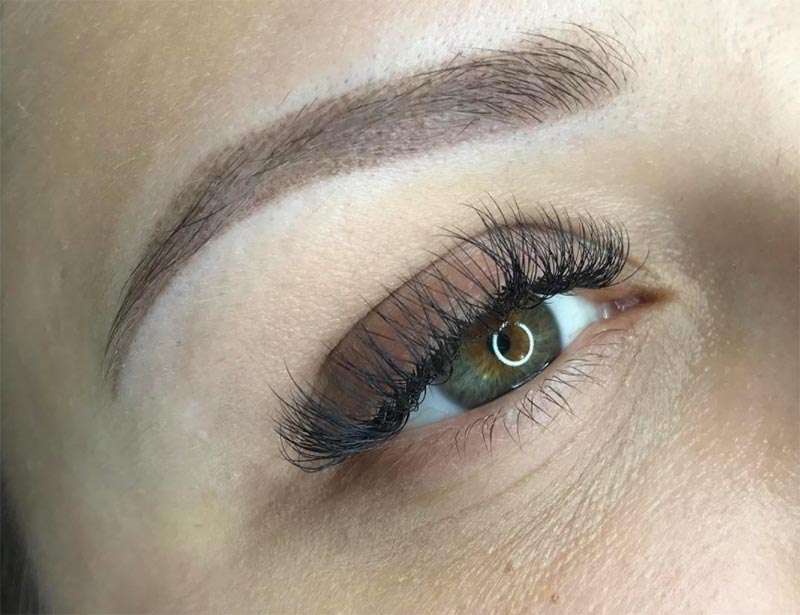
Permanent eyebrows can be done in a powder style that looks just like soft makeup, and even in an ombre style, with three different shades of ink. There is also a semi-permanent option called 3D eyebrow tattoos, also known as microblading.
Microblading is not a traditional cosmetic tattooing – it is instead done with a cluster of needles shaped like a blade, which creates a feathered eyebrow effect. It does not go as deeply into the skin, and it doesn’t last longer than 2 years.
All of these methods, and even a combination, can be great for people suffering from hair loss, or who have a hard time filling in their brows.
Permanent Makeup Removal
While permanent makeup isn’t as permanent as the word tells, since through the years the cosmetic tattoo starts to fade and you may like to repeat the procedure, there are times that you end up with a disaster you wish to instantly erase from your face. Like with normal tattoos, it’ll be quite difficult to remove permanent makeup, and it’s usually done through such harsh beauty procedures as laser resurfacing, dermabrasion (a more advanced, harsher beauty procedure than microdermabrasion), or even through surgical removal.
Another way of getting rid of a bad cosmetic tattoo is camouflaging it with a new pigment emulating your natural skin color, which, however, isn’t the best option.
You should also consider that the removal of permanent makeup is even more painful and time-consuming than the actual process of cosmetic tattooing.
Have you had permanent makeup done? What was the experience like? Is there cosmetic tattoo you would like to get? Let us know!
Photos via Instagram

